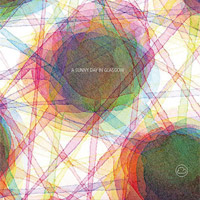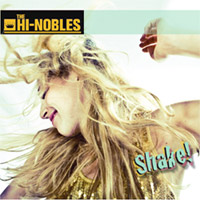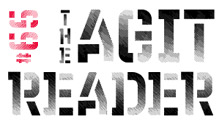
Zounds
Dangerbird
The cosmos have been a much mulled over theme throughout modern music history, whether the results are great (i.e. Bowie’s “Space Odyssey”) or just odd (i.e. actual space music created by deriving celestial signals from planetary shifts). In the case of the genre known as “space rock,” there have been numerous attempts to marry the two seemingly unrelated subjects together. Regardless of the musical merits or functions of those before, Dappled Cities have taken a stab at creating a sort of grandiose space odyssey of their own with their latest release, Zounds. And the result is unearthly in the best possible way.
Though not quite post-rock, Dappled Cities adopt the musical delay and pace changes that is sometimes associated with that movement. They blend borrowed bits artfully into a futuristic electro-pop sound of their own, never compromising to the standards of one style or another. Zounds is the picture of tightly intertwined synth versus strings, which, when mixed together as well as Dappled Cities do, create a strikingly futuristic sound that steers clear of sounding overproduced or tawdry. The time and care that went into the arranging process is evident, and duly appreciated.
Zounds starts off with a bang on the bold and introspective “Hold Your Back,” which, with eyes closed, functions perfectly as the album’s symbolic takeoff, wrought with brooding minor chords juxtaposed with spacey, wistful reverberations and vocals. The theme continues throughout the album, with each opus building upon the other, straying further and further into the unknowns of the universe. The comparatively disco-driven “The Price” is a splendidly raw and emotional vocal display, using repetition and catchiness to its advantage. The entire album is littered with spacey metaphors that recount the very real tribulations of those of us who cannot quite defy the gravitational hold of Earth. Fortunately for those of us who are forever ensnared by gravity’s iron fist, Dappled Cities have provided a 56-minute escape from the confines of our terrestrial ills.
Jennifer Farmer

Ashes Grammar
Mis Ojos Discos
It’s either luck or fate that chose to release A Sunny Day in Glasgow’s sophomore album, Ashes Grammar, at the exact moment the leaves in the Midwest are starting to turn. Following a summer filled with ephemeral “chillwave” jams and tropically tinged indie rock sub-genres, the fever dream searing through the woozy layers and grand expanse of Ashes Grammar plays like the calming denouement to a complex, sweat-soaked season. From a distance, it would be hard to see the tiny gears and motors that propel Ben Daniel’s blissful experiments. Obscured in puffs of swirling haze, flashing pastels and wayward echo, the initial smokescreen of Ashes Grammar could be chalked up to any bunch of nameless shoegazers blaring their album from the basement and through the heating ducts. Certainly the touchstones are there. The dual vocal performance of sisters Lauren and Robin Daniels recalls the celestial intonations of the Cocteau Twins’ Elizabeth Fraser; the warped and warm rushes of synths on “Close Chorus” soothes like a faded copy of Loveless; the methodical patterns of pulsating electronics matched with a very human heart stand as populist as the Postal Service—but none of those signifiers stick. Daniels instead keeps his compositions in an atmospherically confounding state of flux, a place where everything blurs into one prolonged illusionary trip.
In that regard, Ashes Grammar becomes an album that operates as two. On one hand it’s perfectly crafted escapist psychedelia, especially when sewn together with a number of sparkling snippets (“Canalfish,” “Life’s Great”). On the other, when listening becomes focused and intentional, songs like “Shy” and the stunning “Failure” take on greater meaning. The latter shows the band veering away from preciousness and honing in on a tribal symbiosis of rhythm more in line with Animal Collective, eventually swelling towards ecstatic crests before freefalling into a net of crystalline guitar and piano. With all the spurts of serene chaos that seem to encapsulate Daniel’s approach on Ashes Grammar, there’s always safety in the fact that he can expertly pen a jangly pop song and hide it in the folds. Both “The White Witch” and closer “Headphone Space” display this wonder: the power to sonically obscure and melodically dazzle, depending on your perspective.
Kevin J. Elliott
MP3: “Ashes Grammar” and “Ashes Math”

Temporary Pleasure
Wichita
When people look back on this shameless decade of ours and the trends that defined it, Simian Mobile Disco will most likely be viewed as the also-rans of the dance revolution. While like-minded bands, including Daft Punk, Basement Jaxx and Justice, became party-mix heroes, SMD have found only moderate success outside of British electronic circles. And yet all of these groups use basically the same musical ingredients (ridiculous vocal hooks, four-on-the-floor beats, and keyboard riffs that sound as if they were written for electric guitar) so why do DJs James Ford and Jas Shaw always come up with the slightly-inferior product?
The problem is that Simian Mobile Disco lack a set of unique musical characteristics that would allow them to stand out from the crowd. On their new album Temporary Pleasure, in particular, it’s hard to see what Ford and Shaw bring to the table that hasn’t already been devoured and spewed out by their illustrious peers. Take “Turn Up the Dial,” for instance. The song is silly, catchy and one of the duo’s best tracks, but I’d have no trouble believing you if you told me it was a B-side off Basement Jaxx’s Rooty. Earlier on the record, “10,000 Horses Can’t Be Wrong” features the same maniacally constructed chord progressions that can be found all over Justice’s Cross record (granted, Justice and Simian are true contemporaries so it’s hard to say who’s ripping off who). And then the very next track, “Cruel Intentions,” is basically a deadringer for Hercules and Love Affair’s “You Belong,” but with none of that song’s emotional resonance.
Sure, none of this makes Temporary Pleasure an unenjoyable listen. And the album’s latest single, “Audacity of Huge,” is pretty fantastic. (The song’s narrator is Chris Keating of Yeasayer, who says he’s got everything from Roomba robots, grape Kool-Aid-filled swimming pools and bio-diesel dirigibles, so he’s naturally perplexed as to why the woman of his dreams would want nothing to do with him.) But while there’s a load of fun to be had on Temporary Pleasure, the album falls short as a strong artistic statement.
David Holmes
MP3: “Audacity of Huge”

Shake
Zaentz
When you see a band’s MySpace page and they’re all in suits and their description reads “rock/soul/garage” you know exactly what you’re getting. Still it’s kind of hard to tag a band like that with the unoriginal label—that’s almost the point. San Francisco based band the Hi-Nobles are such a band, and their addition to the cannon is the genre-appropriate Shake.
While most of the bands categorized as such are virtually interchangeable, the standouts manage to twist up the formula with either the power of their performance or some individual take. The Hi-Nobles aren’t quite a standout band. Make no mistake, though, everything you’d expect is here in healthy doses. The Hammond organ bubbles and gurgles along energetically; the drummer lays down a rock solid backbeat; there’s serviceable bass work; and the singer sings, howls and croons enthusiastically. But at the end of the day, it’s all very much business as usual.
What Shake does have going for it is that it sounds like a great snapshot of what the band must deliver live. Even through the cold digital medium, the Hi-Nobles seems like the ones to ignite a red-hot dance party. Even the most rhythmically challenged listener would be hard pressed to not give an enthusiastic head shake to songs like “Don’t Go.” And the band does stretch its wings with the A/B switch over of “Gold Tipped Rhino.” The song starts out as four-to-the-floor rave-up, but halfway through turns into a slow burning outro. It’s not mind-blowing, but it’s very nicely executed.
At the end of the day, you can’t get upset when you go to a hot dog stand and you get served a hot dog. With that in mind, the Hi-Nobles’ Shake is a solid but unremarkable diversion.
Dorian S. Ham

Keep in Mind Frankenstein
Sub Pop
Can we please resurrect the term “light rock?” The ’70s are long gone and no one can replace Bread, but many bands are reviving those unmistakably hazy harmonies and wispy arrangements. Good indie light rock should boast more layers than an East Hampton wedding cake. It should capture that narcotic vision of sun-streaked windows and phosphorescent leaves. And like Grand Archives’ new album, Keep In Mind Frankenstein, it should seep ingots of easy listening.
Former Band of Horses and Carissa’s Wierd member Mat Brooke formed Grand Archives in Seattle two and a half years ago, and the band released its first self-title album in February of 2008. Similar to its debut, Keep In Mind Frankenstein was recorded in the old mining town of Index, Washington and was produced by Ben Kersten. It carries, however, more palpable depth and sorrow than its predecessor. With the exception of “Dig That Crazy Grave,” the entire record was scrapped and recreated with under-harangued material. Meaning that the boys winged it. They were barely familiar with each song’s lyrics when they entered the studio, but somehow crafted on-the-fly verses that don’t feel like afterthoughts. Kersten’s encouragement of infusing experimental instruments like a shabby Theremin and a harp made of wine glasses helped maximize the album’s supernatural tone.
The band chose heartbreaking elegy “Topsy’s Revenge” to kick things off. Inspired by the Coney Island elephant that Thomas Edison electrocuted in 1903, it uses the whimpering sounds of the cello, accordion and ukulele to connect the previous century with this one. “Witchy Park” is the most impressive example of Grand Archives’ ability to navigate epic bridges through gentle refrains. Between Grand Archives, the Shins and Fleet Foxes, Sub Pop is likely responsible for 90% of all hipster candlelit dinners.
Alexandra Kelley
MP3: “Silver Among the Gold”

Journal for Plague Lovers
Epic
There is a particular type of limbo for bands who have members die. Such is the case of Manic Street Preachers and their most famous member, guitarist Richey James Edwards. The quartet emerged during the early days of the British indie revival that would eventually lead to Britpop. A cross between the Sex Pistols and Clash-style agit sloganeering, the Manics were a potent blend of image and talent. In short notice, Edwards became a focal point. His most notorious moment was when he carved the phrase “4 Real” into his forearm when a writer questioned the band’s authenticity during an interview. Edwards came close to severing a vein and required 17 stitches to close the gashes—no one ever questioned that Edwards was serious about his band again.
However, Edwards was more than just tabloid fodder. He was also the co-writer on many of the band’s songs and was responsible for much of the Preachers’ visual identity. But as someone who clearly spent much time in the darker corners of their minds, (for example, see the last record Edwards worked on, the sprawling and difficult The Holy Bible) it was no great surprise when he went missing never to be seen again one day in 1995. His body was never found and he was official declared dead in 2008. The band soldiered on as a trio and the remaining Manics—lead singer/guitarist James Dean Bradfield, bassist Nicky Wire and drummer Sean Moore—achieved even more success in the UK and even scored a minor hit in the U.S. with “Design For Life.” Yet despite the post-Edwards success his absence has always lingered.
Maybe it was a result of working on the 10th anniversary edition of The Holy Bible or maybe it was just time, but the band has staged a reunion of sorts with Edwards on its latest record Journal for Plague Lovers. The album is the first with lyrics composed solely by Edwards, who left a folder of writing with Bradfield days before he went missing.
Thankfully, it delivers beyond the emotional resonance. Journal for Plague Lovers finds the band more energized and inspired than they’ve been in years. From head scratching song titles (“Jackie Collins Existential Question Time”) to the surreal lyric structure, you get a glimpse of the Manics of old. While Journal avoids any heavy-handed emotional manipulation, you can’t help but be touched by the album’s closing lyric “I’m really tired. I’d love to go to sleep and wake up happy.” Here’s to hoping it brings closure to them all.
Dorian S. Ham

Masters of the Burial
Arts & Crafts
Part of the appeal of Amy Millan’s main gig as a singer and guitarist for the Canadian pop band Stars is her ability to play off frontman Torquil Campbell. Millan often trades verses with Campbell as they spin tales of love, loss and deceit, told from two different points of view. Millan’s solo work takes a decidedly simpler turn, both lyrically and sonically, and her second effort, Masters of the Burial, is a chance for her to collaborate with friends and play songs she loves, with mixed results.
The album begins with one of its strongest tunes, “Bruised Ghost,” with touchstones of Stars’ sound. There's a beautiful horn solo in the middle of the song, and lilting vocals from fellow Broken Social Scene alum Feist. Speaking of Feist, “Bury This” sounds like a song written for her, with more moody horns and a jangly madolin setting the tone. Both songs speak of leaving the past behind and finding one’s true home. The theme is echoed in the beautifully simple “Run For Me,” a song written by Richard Hawley that features Millan solo on guitar and singing about being tired, getting old, and passing the baton on to a loved one.
There is a cover of Weeping Tile’s “Old Perfume,” which has a nice string arrangement but not much else to offer. It just seems like a song Millan wanted to record. Also a country version of Death Cab for Cutie’s “I Will Follow You Into the Dark” blunts the edge of the orginal tune by speeding it up slightly and including slide guitar. The best of the four covers on the disc is a song by Jenny Whiteley called “Day to Day.” Here Millan strips it down to drums and breathy vocals to deliver a simple message of love.
One might argue that it is simplicity that is the hallmark of Masters of the Burial, that the listener should revel in the clean production and lush, precise folk arrangements. But long-time followers of Amy Millan will yearn for more pop hooks of which to grab hold and a lyrical terrain that is similarly more gripping.
Pat Leonard
ALBUM REVIEWS
Vivian Girls, Everything Goes Wrong
Os Mutantes, Haih or Amortecedor
Wild Beasts, Two Dancers
HEALTH, Get Color
Monotonix, Where Were You When It Happened?
Drive-By Truckers, The Fine Print
The Clean, Mister Pop
AA Bondy, When the Devil's Loose
Datarock, Red
Robert Glasper, Double-Booked
The Dodos, Time to Die
Marmoset, Tea Tornado
Reigning Sound, Love and Curses
Arctic Monkeys, Humbug
